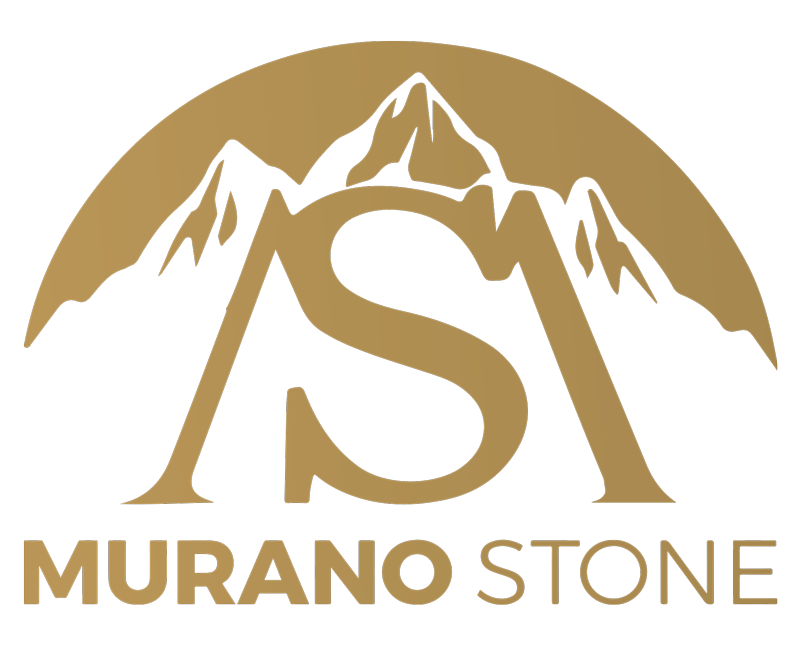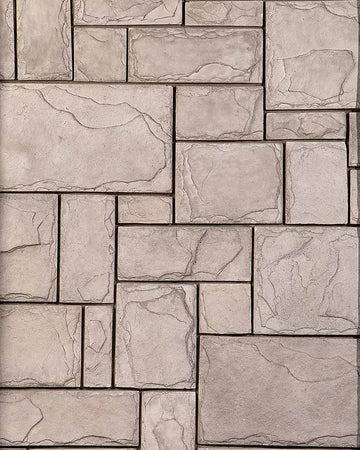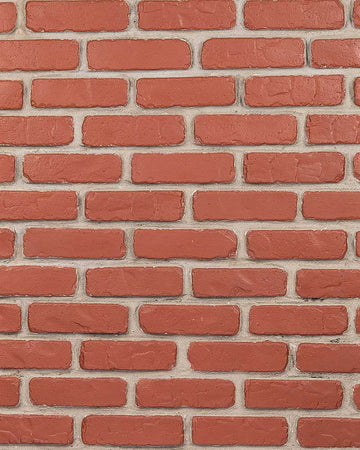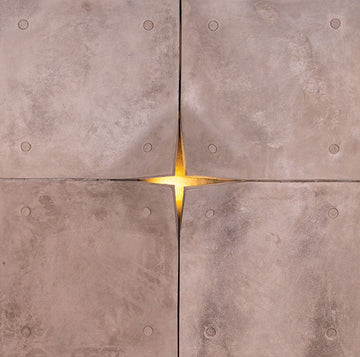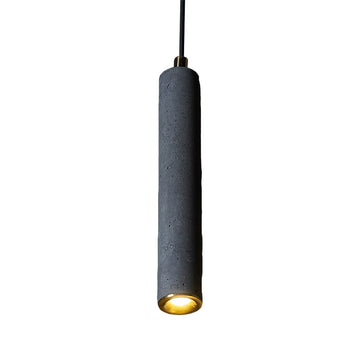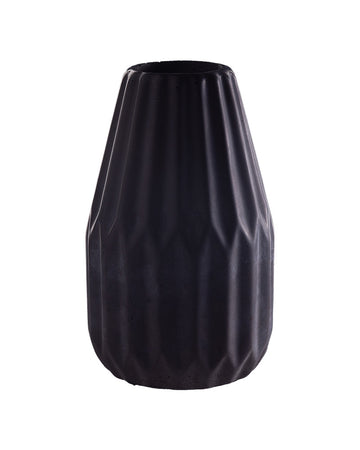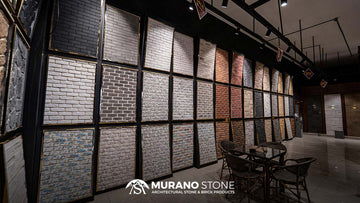اختيار بين الحجر الطبيعي والحجر الصناعي هو أحد القرارات الحاسمة فيما يتعلق بتغطية الجدران. يقدم كلا الخيارين جماليات وفوائد فريدة، مما يجعل الاختيار يعتمد على متطلبات المشروع المحددة. في هذه المدونة، سنتناول خصائص وفوائد ومساوئ الحجر الطبيعي مقابل الحجر الصناعي لتغطية الجدران.
سنستعرض أيضًا بعض المنتجات الشهيرة مثل الحجر الزمردي، وقشرة الحجر المرجاني غير المنتظم، والطوب المصنع، وجيوستون، لمساعدتك في اتخاذ القرار.
الحجر الطبيعي مقابل الحجر الصناعي: أيهما الأنسب لمشروعك؟
عند الاختيار بين الحجر الطبيعي والحجر الصناعي، فإن فهم خصائص كل منهما يمكن أن يساعدك في تحديد المادة الأنسب لاحتياجات مشروعك.
ما هو الحجر الطبيعي؟
الحجر الطبيعي هو مادة يتم استخراجها من باطن الأرض وقد استخدمت في البناء لقرون بسبب متانتها، وجمالها الدائم، وقوتها.
تشمل أنواع الحجر الطبيعي المستخدمة عادة في التغطية الجدارية الجرانيت، والحجر الجيري، والحجر الرملي، والرخام، والشست.
خصائص الحجر الطبيعي:
- المتانة: يمكن للحجر الطبيعي تحمل الظروف الجوية القاسية، مما يجعله مثاليًا للتطبيقات الخارجية.
- الجمال الفريد: كل قطعة من الحجر الطبيعي فريدة من نوعها، مما يضفي على تغطية الجدران مظهرًا عضويًا ومميزًا.
- صديق للبيئة: بما أنه مستخرج مباشرة من الطبيعة، يعتبر الحجر الطبيعي صديقًا للبيئة إذا تم استخراجه بشكل مسؤول.
ما هو الحجر الصناعي؟
الحجر الصناعي، المعروف أيضًا بالحجر المصنّع أو قشرة الحجر المصنعة، هو مادة مصنوعة من خليط من الأسمنت والركام والأصباغ مصممة لمحاكاة مظهر الحجر الطبيعي. يتم إنشاؤه في قوالب مأخوذة من الحجر الحقيقي، مما ينتج عنه أنماط وملمس واقعي.
خصائص الحجر الصناعي:
- خفيف الوزن: الحجر الصناعي أخف بكثير من الحجر الطبيعي، مما يسهل نقله وتركيبه.
- الاقتصادية: بشكل عام، الحجر الصناعي أكثر تكلفة من الحجر الطبيعي بسبب انخفاض تكلفة المواد والتركيب.
- مرونة التصميم: يمكن تصنيعه بألوان وأشكال متنوعة، مما يوفر مرونة أكبر في التصميم.
الحجر الطبيعي لتغطية الجدران: الفوائد والمساوئ
لقد تم استخدام الحجر الطبيعي لقرون في الهندسة المعمارية بسبب جماله الطبيعي ومتانته. عند النظر في خيارات تغطية الجدران، يقارن الكثيرون بين الحجر الطبيعي والحجر الصناعي لتحديد المادة الأنسب لمشروعهم.
الفوائد:
- جمال دائم: يوفر الحجر الطبيعي مظهرًا غنيًا وأصيلًا لا يمكن لأي منتج مصنع أن ينافسه. التباين في الألوان والأنماط والتعرجات الطبيعية تخلق إحساسًا بالفخامة والديمومة.
- المتانة: الحجر الطبيعي متين للغاية، وغالبًا ما يدوم لقرون مع الحد الأدنى من التآكل. كما أنه مقاوم للظروف البيئية مثل الأمطار والرياح والتعرض للأشعة فوق البنفسجية.
- الصيانة: اعتمادًا على نوع الحجر المستخدم، قد لا يحتاج الحجر الطبيعي إلى صيانة سوى التنظيف العرضي.
- التأثير البيئي: إذا تم استخراجه بشكل مسؤول، يمكن اعتبار الحجر الطبيعي صديقًا للبيئة لأنه لا يتطلب عملية تصنيع كيميائية.
المساوئ:
- التكلفة: عادةً ما يكون سعر الحجر الطبيعي أعلى بسبب الاستخراج والتقطيع والنقل. كما تميل تكاليف التركيب إلى أن تكون أعلى بسبب وزن المادة.
- التركيب: يمكن أن تجعل وزن وحجم ألواح الحجر الطبيعي عملية التركيب أكثر كثافة في العمل. وهذا قد يطيل الوقت الذي يستغرقه إتمام المشروع.
- اختيارات اللون المحدودة: يأتي الحجر الطبيعي في نطاق ألوان وأنماط محدود مقارنة بالحجر الصناعي.
الحجر الصناعي لتغطية الجدران: الفوائد والمساوئ
أصبح الحجر الصناعي خيارًا شائعًا في الجدل بين الحجر الطبيعي والحجر الصناعي، خاصة لتغطية الجدران، حيث يقدم حلًا عصريًا لأولئك الذين يبحثون عن الأسلوب والعملية. ومع ذلك، مثل أي مادة بناء، يأتي مع مجموعة من الفوائد والقيود. فيما يلي نلقي نظرة على الفوائد والمساوئ لاستخدام الحجر الصناعي لتغطية الجدران لمساعدتك في اتخاذ قرار مستنير.
الفوائد:
- التكلفة المنخفضة: الحجر الصناعي أكثر اقتصادية، سواء من حيث تكلفة المادة أو تكاليف التركيب. تقلل خفة الوزن من تكاليف العمالة والوقت المستغرق في التركيب.
- تشكيلة واسعة من التصاميم: يمكن تصنيع الحجر الصناعي في أي لون وملمس تقريبًا، مما يوفر للمعماريين والمصممين لوحة ألوان واسعة للعمل بها.
- سهولة التركيب: بفضل خفة وزنه وحجمه الموحد، يكون الحجر الصناعي أسهل بكثير في التركيب مقارنة بالحجر الطبيعي. كما يجعله خيارًا أفضل لعشاق المشاريع الذاتية.
- المتانة في البيئات المتحكم بها: في المناخات التي لا تكون فيها الظروف الجوية القاسية مصدر قلق، يتحمل الحجر الصناعي بشكل جيد على مر الزمن.
المساوئ:
- مظهر أقل أصالة: رغم أن العديد من أنواع الحجر الصناعي هي نسخ ممتازة، إلا أنها قد تفتقر إلى العمق والخصائص الفريدة للحجارة الطبيعية. وغالبًا ما يكشف الفحص الدقيق الفرق بين الاثنين.
- المتانة: الحجر الصناعي ليس قويًا أو متينًا مثل الحجر الطبيعي، خاصة عند التعرض للظروف البيئية القاسية مثل الحرارة الشديدة أو الأمطار الغزيرة أو درجات الحرارة المتجمدة.
- القلق البيئي: يتطلب إنتاج الحجر الصناعي طاقة ومواد كيميائية، مما يجعله أقل صداقة للبيئة مقارنة بالحجر الطبيعي.
مقارنة بين الحجر الطبيعي والحجر الصناعي
لكن ما يميز الحجر الطبيعي عن الحجر الصناعي حقًا هو تكوينهما:
التكلفة
بينما يتفوق الحجر الصناعي بوضوح في التكلفة، يمكن أن يضيف الحجر الطبيعي قيمة كبيرة لعقارك بسبب جاذبيته الدائمة ومتانته. إذا كنت تعمل ضمن ميزانية محدودة، قد يكون الحجر الصناعي خيارًا أكثر ملاءمة، لكن الحجر الطبيعي قد يقدم عوائد أفضل للاستثمار على المدى الطويل.
الجاذبية الجمالية
يوفر الحجر الطبيعي جاذبية طبيعية لا يمكن لأي منتج صناعي أن ينافسها، وغالبًا ما يُعتبر الخيار المتميز لتغطية الجدران. توفر أنماطه وملامسه الفريدة لمسة خاصة في كل تركيب. من ناحية أخرى، يمكن للحجر الصناعي محاكاة مظهر الحجر الطبيعي عن كثب، على الرغم من أنه يفتقر إلى نفس الأصالة والعمق.
المتانة والصيانة
بالنسبة لتغطية الجدران الخارجية في المناخات القاسية، يعد الحجر الطبيعي الخيار الأفضل. فهو أكثر متانة ويتطلب صيانة أقل على المدى الطويل. ومع ذلك، بالنسبة للتطبيقات الداخلية أو المناطق التي تتمتع بمناخ معتدل، يقدم الحجر الصناعي حلاً أكثر اقتصادية مع صيانة أسهل.
الصداقة البيئية
في مقارنة الحجر الطبيعي والحجر الصناعي، يلعب الاستدامة البيئية دورًا كبيرًا في المشاريع الصديقة للبيئة. يميل الحجر الطبيعي إلى أن يكون الخيار الأكثر صداقة للبيئة إذا تم استخراجه بشكل مسؤول. بينما يوفر الحجر الصناعي مرونة اقتصادية وسهولة في التركيب، إلا أنه يحتوي على بصمة كربونية أكبر بسبب عملية تصنيعه.
المنتجات الشائعة لتغطية الجدران
عند تعزيز جماليات وقوة أي بناء، يوفر الحجر الطبيعي والحجر الصناعي مجموعة متنوعة من الأنماط والتشطيبات، مما يوفر توازنًا مثاليًا بين الوظيفة والتصميم.
حجر الزمرد
حجر الزمرد هو حجر عالي الجودة معروف بألوانه الخضراء الزاهية وتعرجاته الدراماتيكية. إنه خيار ممتاز للمشاريع الراقية حيث يكون الجمال هو الأولوية. يعمل حجر الزمرد جيدًا في تغطية الجدران الداخلية والخارجية، مما يضيف لمسة من الفخامة إلى أي مساحة.
قشرة الحجر المرجاني غير المنتظم
تقدم قشرة الحجر المرجاني غير المنتظم مظهرًا فريدًا ومتنوعًا مع شكل عضوي يتناسب جيدًا مع التصاميم الريفية أو البحر الأبيض المتوسط. هذه القشرة مثالية لتغطية الجدران المميزة أو الواجهات الداخلية أو حتى التغطية الجدارية الخارجية في المناطق الساحلية.
الطوب المصنع
الطوب المصنع هو شكل من أشكال الحجر الصناعي الذي يحاكي مظهر الطوب التقليدي ولكنه يتمتع بهيكل أخف وأقل تكلفة. هذه الطوب مرنة، وسهلة التركيب، ومتوفرة بألوان متنوعة، مما يجعلها مثالية للديكورات الحديثة والتقليدية.
جيوستون
جيوستون هو نوع من قشرة الحجر الصناعي التي تحاكي مظهر الحجر الحقيقي. إنه خفيف الوزن وسهل التركيب، مما يجعله خيارًا شائعًا للمشاريع السكنية والتجارية. يت
